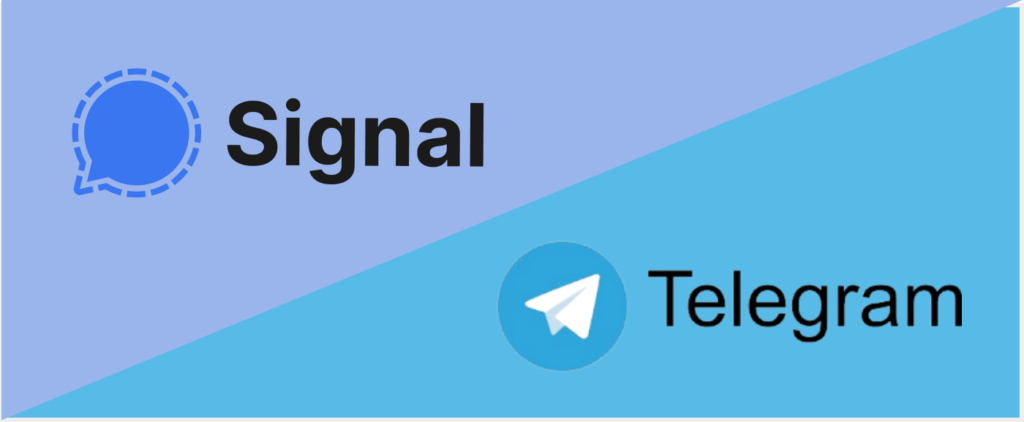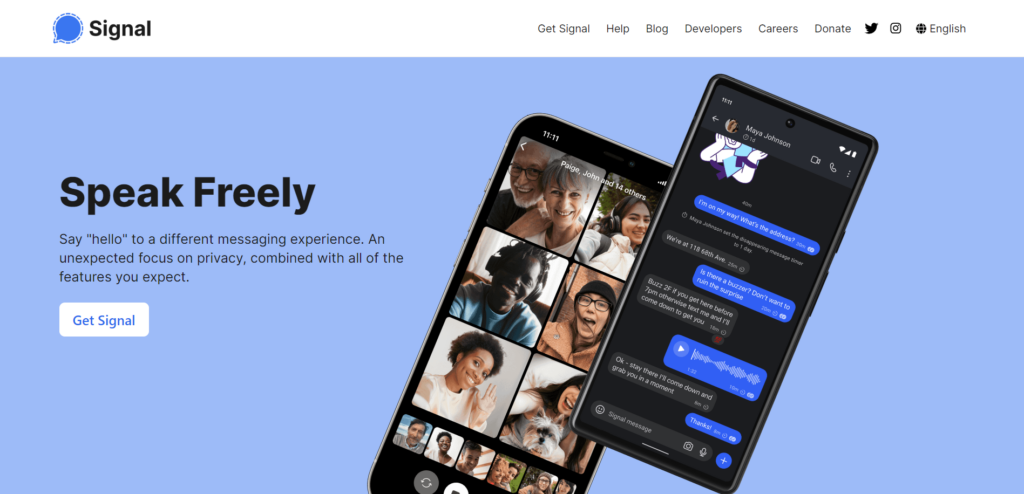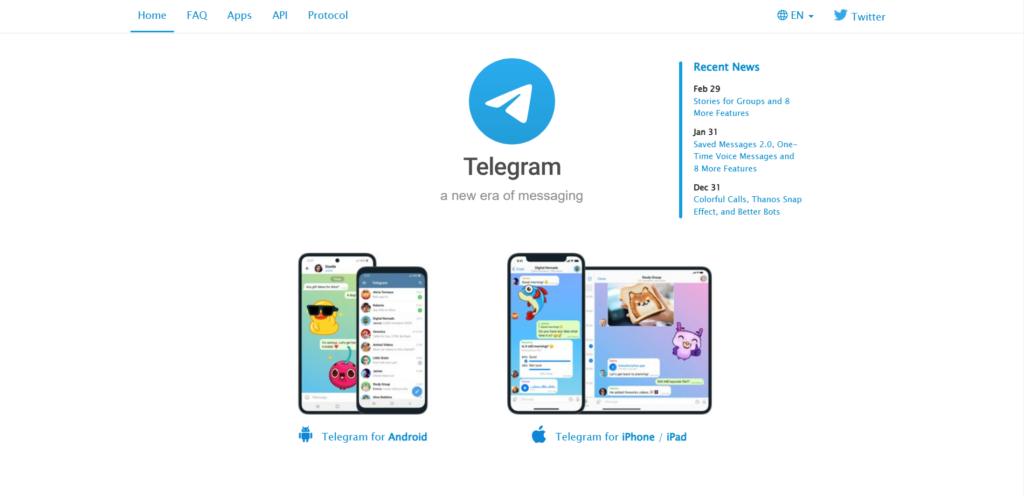Since data privacy concerns are increasing, people are moving away from popular messaging platforms. Signal and Telegram are two popular alternatives to WhatsApp. Both of these platforms allow you to communicate through chats, media sharing, or calls. However, they differ greatly in how they handle privacy and encryption.
This article will explore the differences between Signal and Telegram and explain which is more secure and why. After reading this guide, deciding which messaging app is best for you will be a walk in the park.
Quick Comparison between Signal and Telegram

Check out our quick summary of the differences between Signal and Telegram.
| S/N | Features | Signal | Telegram |
|---|---|---|---|
| 1 | Active user base | 70 million | 1 billion |
| 2 | Ads | None | Yes |
| 3 | Authentication to access the app | Passcode or biometrics | Passcode or biometrics |
| 4 | Data collection | Your phone number, at most. | IP address, username change history, devices, and Telegram apps you’ve used. |
| 5 | Encryption | E2EE for all conversations. | E2EE for private chats, while other services use client-server encryption. |
| 6 | File compression | You can send files with or without compression | You can send files with or without compression |
| 7 | Group capacity | 1,000 members | 200,000 members |
| 8 | Hide your phone number | No | Yes |
| 9 | Open source | Yes | Yes |
| 10 | Premium tier | No paid tier | Telegram Premium offers additional features |
| 11 | Pricing | Free | Free, with a paid tier |
| 12 | Self-destructing chats | Yes | Yes |
| 13 | Supported devices | Supports apps for mobile phones, tablets, and desktops. There are no web-based services | Supports apps for mobile phones, tablets, and desktops. There are web-based services |
| 14 | Transfer limit | 100 MB | 2GB (4GB for Premium) |
| 15 | Two-factor authentication | You set the PIN yourself | You set the password yourself |
| 16 | Video calls | Yes | Yes |
| 17 | Voice calls | Yes | Yes |
What is Signal?

Signal is an instant messaging app that allows users to send direct or group messages via end-to-end encryption (E2EE), such as pictures, videos, and other media, across multiple devices. Users who value privacy see Signal as an excellent option because of its strong security features.
This app was created by the non-profit Signal Foundation, meaning they have almost no reason to try to collect or profit from their users’ data. Also, the platform’s code is open source, so its activities are transparent, secure, and trustworthy.
What is Telegram?

Telegram is a cloud-based messaging platform known for its speed and security features. The app offers end-to-end encryption and allows users to make chats, video calls, and media with each other. Although it was launched in 2013, Telegram grew in popularity between 2019 and 2020 because of its group chat function.
Unlike many other apps, Telegram can accommodate up to 200,000 members in a group. Because it’s hosted in the cloud, you can’t lose your data and can connect across multiple devices.
Is Signal Better than Telegram?
There is no one-size-fits-all answer to this question. Signal and Telegram are excellent and secure messaging apps with similar core features. However, we’ll examine their key differences to help you understand how they compare so you can decide which is better for you.
1. Encryption
Signal
Signal’s E2EE means that only you and the person you’re communicating with can see your messages. Even its servers cannot access the information you’re exchanging with your chat partner.
The app’s creators developed Signal Protocol, the encryption technology used by Signal. It has proven to be very secure and highly resistant to attack, so it’s no wonder other messaging platforms like Facebook and WhatsApp have adopted it for their Secret Conversation features.
Telegram
Unlike Signal, your Telegram chats and calls have end-to-end encryption only when using the Secret Chats option. Nonetheless, your regular messages, live streams, voice calls, and video calls use client-server encryption.
You cannot forward those private messages using the Secret Chat mode. Also, you can activate the self-destruct timer, which allows your messages to vanish between one second and one week.
Our verdict
Signal’s E2EE of all messages means it has more robust security, while Telegram’s use of different encryption makes it more flexible.
2. Device Support
Signal
Signal has apps for both Android and iOS. The desktop apps for Windows, Linux, and macOS computers are also available, but you must link them to your mobile app. Other things to note about Signal’s device support include:
- There is an iPad app.
- There is no Android tablet app yet, but the regular Android app can work on tablets with phone functionalities.
- You can’t log in using your browser because there is no web-based option for encryption security reasons.
- Any device you use has to be linked to your phone because it has your mobile number.
- You can link five devices to your primary device (your phone’s account).
- Your messages are synced across all devices, but your older messages would not show on a newly linked device.
Telegram
There are Telegram apps for Android, iOS, and tablet devices. It also has desktop apps for Windows, macOS, and Linux. Other device support information includes:
- You don’t have to link your desktop apps to your smartphone.
- The web-based version is available when you log in on your browser.
- You can sync your Telegram account across an unlimited number of devices. Thanks to its cloud-based technology, older messages will also be available on a newly synced device.
Our verdict
Telegram supports more platforms, and you can sync your chat across unlimited devices. Signal falls short on device support because it prioritizes E2EE. If you want flexibility, Telegram is the way to go. But if you want E2EE security, then Signal is for you.
3. Protocols
Signal

The Signal Protocol was developed in 2013 by Signal’s Open Whisper System, and its code is open source. With this protocol, a user’s identity remains hidden during communication. As such, anyone trying to monitor encrypted messages can’t tell where they are coming from; they will only see where they are going.
The Signal Protocol also has forward secrecy. Essentially, if the encryption key is compromised, an attacker will only have access to old messages, but the new ones will be safe. Additionally, the platform combines other security protocols like a triple Diffie-Hellman handshake, the Double Ratchet Algorithm, and prekeys for extra security.
Telegram

Telegram uses the MTProto protocol. The app’s development team designed it in 2017, and it had some security flaws back then. However, the most recent version of the protocol is more robust.
Our verdict
The MTProto protocol is generally safe, but it’s still less secure than Signal’s Signal Protocol.
4. Ease of Signup
Both apps have similar signup processes, and you must provide your phone numbers to get started. Check out the main signup steps below:
- Download the app.
- Enter your phone number and indicate your country.
- Verify your phone number using the code you’ll receive via SMS.
- Set up your profile, including your preferred name and an optional picture that will be visible to others.
Signal
Signal identifies your account using your number. The platform also allows other Signal users with your number to contact you.
Telegram
Telegram also identifies you using your phone number. Additionally, you can create and share a username for others to communicate with without revealing your phone number.
Our Verdict
Signing up on both platforms is easy once you provide your phone number. However, Telegram’s username option offers greater privacy as you can connect with people without giving up your phone number. That said, it’s important to mention that Signal has announced that it’s also exploring the username option.
5. Usability
Both platforms’ apps are easy to install, with the option of creating an anonymous account if you want to. Here are other things to keep in mind regarding the usability of these messaging apps.
Signal
- Signal has basic themes and colors that are easy to set up.
- It is more focused on secure messaging than social media messaging.
- This messaging app has an in-built face-blur option that blurs images when you’re sending them for better privacy.
- You can activate the proxy server connection on Signal to use the app in geo-restricted locations.
- Signal is built to offer secure messaging to users who have blindness.
- You can consult various online resources when you need assistance using the platform.
Telegram
- Telegram has numerous themes and colors you can adjust to suit your preference.
- This app prioritizes broadcasting and social media messaging.
- It’s more effective for sending pictures because you don’t have to compress images to send them.
- Telegram also has resources, vibrant online communities, and channels you can visit if you have questions or issues using the app or website.
Our verdict
Signal focuses on reaching a global audience, while Telegram is more about building social media communities.
6. Group Chat Features
Signal

As expected, Signal’s group chat activities are strongly encrypted, including voice and video calls. The other features of this system include:
- Group admins can add and remove members, change the group name and avatar, and set disappearing messages.
- Admins can create a link to invite new people to the groups without having their phone numbers.
- Members can tag specific people on the group chat so they can receive direct notifications.
Telegram

Telegram can allow up to 200,000 members in a group, a massive gap between Signal’s 1,000 and WhatsApp’s 1,024 group members. This is the primary reason why Telegram is used widely for large communities, movements, and public coordination.
Other things to know about Telegram’s group chat are:
- You can have group voice and video calls.
- Telegram bots can help in moderation, entertainment, and other automated services.
- Group administrators can create quizzes and polls directly in the group chat.
- They can also adjust group settings, manage memberships, moderate chats, and give advanced permissions to members.
- When a group’s members reach 200, it converts to a supergroup with access to advanced functionalities like pinned messages and other admin tools.
- Group members can receive notifications when mentioned or replied to directly.
- Users can search public groups using their handles, and it is free for anyone to join.
- Private group membership is only possible through invites.
Our verdict
You have to decide whether you want versatility or privacy. Telegram has numerous group chat features, but it is not end-to-end encrypted. On the contrary, Signal is end-to-end encrypted but has limited group chat features.
Other Features
Signal
- You can activate the self-destructing messages option so that messages can disappear after a specified time.
- There’s also the media view-once option, where photos or videos disappear once viewed.
- The platform does not have ads, affiliate marketing, or trackers because the company behind it is a non-profit organization.
- Signal’s screen lock security feature prevents the preview of messages from showing on your recent app list.
- Senders’ identities are safe from the app’s servers.
- You can set your biometrics or a PIN to access the app.
- Every conversation has a unique safety number that people can use to verify the security of their communication.
- You have a chat thread with yourself on Signal. This is useful for taking notes or keeping vital information at your fingertips across multiple devices.
- You can use Signal’s server to relay or route your calls to hide your IP address.
Telegram
- Features like Telegram’s bot allow you an enhanced and automated app experience.
- You can share different types of files up to 2 GB.
- The Secret Chat feature is end-to-end encrypted. It also allows for self-destructing messages that you can use for your regular chats.
- You can customize the app’s appearance using different themes and backgrounds.
- There are numerous emojis, in-built stickers, and custom-made ones to make chatting more fun.
- Telegram allows for high-quality voice and video calls.
- Using a username, you can connect with others easily without revealing your phone number.
- The provision of folders and tabs allows you to manage many chats and conversations.
Note that whatever you do online or the app you’re using, it’s always best to maximize your safety using a high-quality VPN like ExtremeVPN.